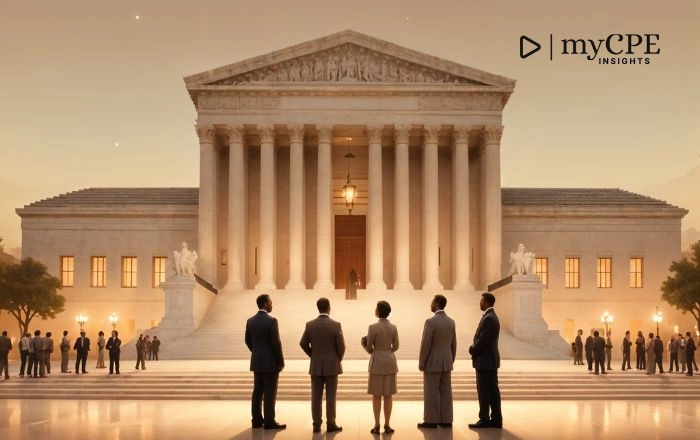


Join 250,000+
professionals today
Add Insights to your inbox - get the latest
professional news for free.

Join our 250K+ subscribers
Join our 250K+ subscribers
Subscribe22 JUL 2024 / BUSINESS

The US Supreme Court has recently upheld the constitutionality of the Transition Tax, also known as the Mandatory Repatriation Tax, in a 7-2 decision in the case, Moore v. United States. Significant for American expatriates, the ruling confirms that Congress can tax unrealized foreign earnings, with potential tax liabilities on overseas profits.
Did the Supreme Court just give the green light to the TCJA Transition Tax in the Moore case? You will only know if you keep reading! The U.S. Supreme Court recently upheld the constitutionality of the Transition Tax, also known as the Mandatory Repatriation Tax (MRT), in the Moore case. This 7-2 decision confirms that Congress can tax unrealized foreign earnings. Thus, impacting American expatriates who may face significant tax liabilities on overseas profits.
Now, let’s brush up our understanding of what a Transition Tax is. The transition tax is a one-time tax imposed on the untaxed foreign earnings of certain U.S. corporations. It aims to encourage the repatriation of foreign profits. Corporations must pay a reduced tax rate on these earnings, regardless of whether they are repatriated or not. The statistics below indicate that stacks are high:
Let’s take a closer look at the case. Grab yourself a coffee as we take you back to 7 years and discuss the origin. Shall we? In 2005, Charles and Kathleen Moore invested $40,000 in KisanKraft for 11% of its common shares. KisanKraft is a Controlled Foreign Corporation (CFC). But, during that time, U.S. taxpayers did not have to pay taxes on foreign earnings until they were distributed. However, the implementation of the Tax Cuts and Jobs Act (TCJA) in the tax system changed this with Section 965. As a result, Moore's were assessed a transition tax of nearly $15,000 based on their share for 2017.
Later in 2018, Charles and Kathleen Moore paid their taxes and sued the government for a refund, claiming taxing unrealized income violated the 16th Amendment. Their case started in a Washington district court, which ruled against them. Then they appealed to the Ninth Circuit Court of Appeals, which also ruled against them, affirming Congress's right to levy the transition tax. Undeterred, Moore's took their case to the Supreme Court, hoping for a different outcome.
On December 20, 2023, the Supreme Court heard arguments. Moore's attorneys argued that the tax code exempts taxpayers from income tax until they realize gains through asset liquidation. They had suggested distinctions between the types of taxes and the repatriation tax. However, the Court rejected all those distinctions.
After hearing the prosecution, most of the judges seemed skeptical of the plaintiffs' arguments. In particular, Judge Kavanagh tied the pass-through tax provisions to other provisions of the Internal Revenue Code. The judges interrogated lawyers for both sides on how the transition tax challenged by Moore differed from other provisions of the Internal Revenue Code, particularly Subpart F and the domestic pass-through units.
Did they make a decision? Yes! Keep scrolling to find out what the judges said! On June 20, 2024, SCOTUS published its opinion in favor of the government by a 7-2 margin. It confirmed the government's approach to taxing foreign earnings and also stated that the transitional tax is constitutional.
The decision was written by Justice Kavanaugh, along with Chief Justice John Roberts, Justice Sonia Sotomayor, Elena Kagan, and Justice Jackson. That majority opinion stated that the opinion doesn’t determine whether the Constitution requires realization. But even if the Constitution does require realization the repatriation tax remains a tax on realized income.
Justice Jackson concurred that realization is not a constitutional requirement, validating the repatriation tax. However, Justice Amy Coney Barrett, joined by Justice Samuel Alito, argued that realization is necessary. They suggested that subpart F and the repatriation tax might be unconstitutional, but since the Moores conceded subpart F's validity, they couldn't oppose it.
Justice Kagan, in the majority opinion, acknowledged Moore's fairness concerns but emphasized that tax policy involves trade-offs. The transition tax aimed to level the playing field for all taxpayers. In dissent, Justice Clarence Thomas and Justice Neil Gorsuch argued that actual payment is necessary under the Constitution. They claimed the repatriation tax was unfair as it taxed income from previous years.
Despite the dissent, the ruling upheld the transition tax, meaning billions in tax revenue wouldn't be refunded. The Moore's were disappointed, but their case highlighted significant issues in tax policy. This covers everything about the Moores v. Supreme Court case! What's your main takeaway from this? Keep reading to discover!
The Supreme Court's decision in Moore vs. United States has significant implications for tax professionals. It is important to understand the tax ruling and its impact. Here are some key steps you should take:
The Supreme Court's decision in Moore v. United States marks a big moment! If you're in the tax business, understanding this ruling is crucial. It's about staying compliant and planning taxes effectively. Stay tuned for more updates and keep learning to stay ahead in the ever-changing tax world.
Until next time…
Don’t forget to share this story on LinkedIn, X and Facebook
📢MYCPE ONE Insights has a newsletter on LinkedIn as well! If you want the sharpest analysis of all accounting and finance news without the jargon, Insights is the place to be! Click Here to Join